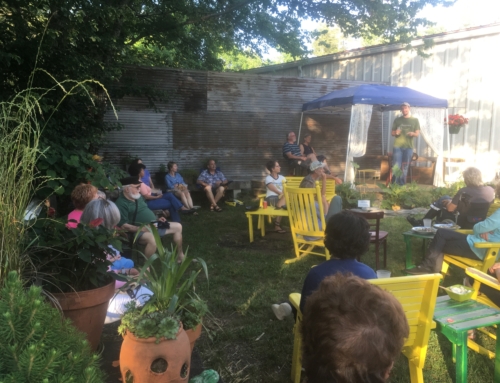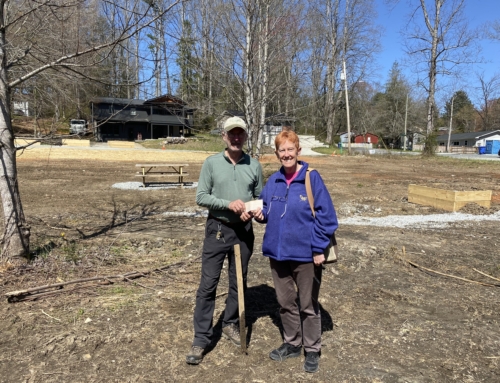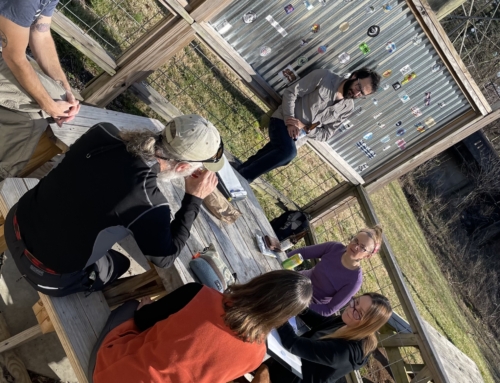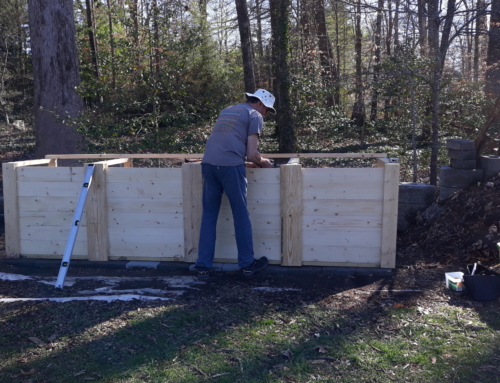By Willow Walker
On August 6th, a small group of Conservers got to visit Danny’s Dumpsters, a commercial composting facility that serves Asheville and surrounding areas, turning large volumes of food scraps into a rich, soil enhancing product. The facility is owned and operated by Danny Keaton, who also handles the collection and hauling of food scraps for composting at his facility.
Danny started collecting food scraps for composting in 2009, first taking those materials to an existing composter in the area. When that facility closed, he opened his own composting facility to continue diverting food wastes from the landfill. He currently leases property from the City of Asheville in an out-of-the way yet convenient location near the Nature Center and Swannanoa River in Asheville where large piles of mulch-like materials, surrounded by lots of standing water from recent rains, are transformed into nutrient rich compost.
Given the Conservers interest in starting a composting facility here in Brevard, Danny began our tour by discussing the permitting requirements necessary to accept commercial food and yard waste from off-property. First, he worked with the NC Department of Environmental Quality (DEQ) to obtain a Type 3 demo permit to process food scraps, which allowed him to get set up and operating before obtaining a full Type 3 permit. Then, he got help from Advanced Composting Technologies located in Candler, NC to create the necessary receiving, processing, and leachate (liquid) holding areas for the facility.
The food wastes come from a variety of commercial accounts, including Mission Hospital and several restaurants in the Asheville area. Danny provides 64-gallon carts for customers to store food wastes in for pick-up, and uses trucks with a lift-gate to pick-up full carts and provide empty carts for each account on a regular schedule. He currently collects and processes approximately 40 tons of materials each week.
At first, he washed out the carts once emptied, but due to the nastiness factor (smells, stickiness, water and labor needed to wash out the carts, and the nasty water that needed disposal after washing), he now lines his carts with plastic bags, which accompany the food scraps throughout the composting process until they are sorted and removed from the end product. He tried using compostable liners at first, but these liners could not handle the weight of the food scraps and were too expensive long term. The ground “browns” or carbon rich materials come from City of Asheville collections of yard waste, and also from area tree companies who can dump their wood chips at Danny’s facility free of charge.
New, incoming food wastes are received and mixed with wood chips on an impermeable concrete pad, to ensure pathogens and bacteria do not escape into the surrounding groundwater. In general, by volume, a 1:2 mix of food wastes to woody or leafy materials (i.e., a 1:2 ratio of nitrogen to carbon) is required for successful composting. Once mixed, these materials are put into shipping containers that have been modified with aeration pipes welded to the bottom, which provide constant, forced air into the vessel and pile of materials.
The materials are held in-vessel until temperatures meet permit requirements (118 degrees or more for two weeks), which indicate microbial activity and the breakdown of materials has begun. These high temperatures are necessary to ensure pathogens and bacteria are eliminated in the finished product. Once the material reaches the permit temperature requirements, it is then removed from the vessels and kept in large piles for approximately six months so that the composting process can continue.
Danny uses a tractor with a bucket on the front to move and turn the piles of material periodically, to ensure an equal distribution of air, moisture, and temperatures necessary for all organic materials to breakdown and compost as desired. Once the temperatures have dropped below 80-90 degrees for a certain period of time, which indicates the composting process is complete, he rents a large trommel screening machine to separate the finished compost from contaminants (i.e., plastic bags used for collection, silverware, plastics, and any other materials more than 2” in size). There were several large piles of contaminates that had been screened out and removed from the compost on site, which is typical for facilities accepting commercial food waste.
Danny was very open in sharing his business model, so we could get a good feel of how the economics of his operation actually work. He noted that 90% of his revenue comes in on the front end, or on the collections side of the business, and that only 10% of his revenue comes from the sale of the finished compost. This is pretty typical for commercial composting operations as well.
He also noted that several of his food scrap accounts were willing to pay more to have their food scraps collected separately from other wastes, because they wanted to do something beneficial to the environment and their community. However, the extra cost or savings for having food scraps collected separately from other wastes varied greatly by account, and is based on existing waste collection contracts.
In addition to traditional in-vessel and windrow composting, Danny has also been experimenting with large-scale black soldier fly larvae to process large quantities of food scraps over the last few years. It is a relatively new process in the U.S., and produces a completely different product than composting. Rather than a soil amendment at the end of the process, the larvae quickly consume the food wastes, and become a protein source for animal feed and other agricultural use.
Needless to say, we learned a great deal from Danny during our visit. We are very grateful to him for his time, his seemingly inexhaustible energy, all the information he shared, and his continued efforts to keep food wastes out of the landfill. And special thanks to Jan Foster of Waste Reduction Partners for arranging this tour for us!
For more information on Danny’s Dumpsters, please visit his website at www.dannysdumpster.com.




